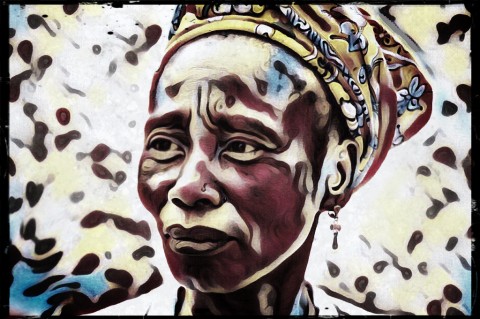It is morning. The sun is still asleep, and a blue haze hugs everything in its wake. We are in Holy Family Catholic Church for the Sunday mass. My mother, my brother, and me. My father is no longer with us. We are seated on the last pew, close to the exit facing the grotto.
I watch my mother as she watches the other women. Women in expensive brocade, golden jewellery circling their hands and necks. Women whose husbands sit stiff and proud beside them in matching native attires. Women whose faces are so smooth and bright yellow, I wonder if God chose to carve them differently from my mother, whose face is dark with a fresh scatter of pus-filled pimples.
My mother’s eyes wander, gleaning the gracefulness on other bodies not hers. Her mouth opens and closes, opens and closes. It is as though she has ceased breathing—the air seems to choke her. Her hands clasp, callused fingers intertwine and fold into the space between her parted thighs, pulling her faded skirt inward, creasing it. Her feet lie atop each other, her mended shoes suffering mud stains. She does not know that she embarrasses me—us, her two boys. Her gaze rests on a woman in glistening ankara and gold heels whose honey-coloured skin is unlined. Her eyes grow dark, and I think she will cry.
Servers in white cassocks scramble to light candles and move chalices from one end of the altar to the other. A man climbs onto the altar, genuflects, walks to the lectern, and announces mass intentions.
I know our mother will make us leave before communion. She always says she has to visit the market, or cook so we do not starve, or water her vegetables before the sun comes up. But I know she is lying—she does not want to be choked by the beauty of other women. She returns home only to sit in front of the mirror for long hours and cry and mumble to herself.
One night a woman from the next street came pounding on our front door. My brother and I had gone to play football in her compound. I ended up in a fight with her son. The boy slapped my brother and called him an imbecile because my brother had refused to pass him the ball.
That night, I peeped through the curtains and watched the boy’s mother threaten mine. “I see that you and your useless boys want to destroy me by killing my son,” the woman said. “It will not work. The God that I serve will not let it happen. In fact, as I’m leaving here, my husband and I are reporting you and your bastards to the police.”
My mother wept and pleaded on her knees, both hands held behind her shaved hair, the loose wrapper around her waist sweeping the dusty ground. After the woman left, I tiptoed to the bedroom to lie beside my brother on the mat. I heard my mother’s footfalls as she staggered to our room, feeling her way through the pitch dark. She cried softly by the door, “Oh God, what sort of life is this? Why did you have to take di, my dear husband, away from us? Will it not have been better if you had taken us all at once? Ah, why let us suffer?” I could make out her lanky form bristling with anger at God.
The following morning, I found her lying on the concrete floor, her eyes sore, wide open, her blouse ripped along the middle as though she had been in a fight all through the previous night.
Now, here at mass, my mother’s eyes linger on this woman who walks to the front pew to fetch hymn books for her husband and two little girls. The mass begins. The choir sings “All People That on Earth Do Dwell.” I join in the chorus. A tall crucifix appears from the vestry. The lights come on—white and bright. Around me, everything glitters: the gothic arches with paintings of Jesus, the walls heavy with Catholic symbols, frescoes, the silver chandelier. The priest emerges behind a procession of altar servers and lay readers. My brother is smiling. Still, my mother is watching this woman who is now dancing. The colour is draining from her face. She bends her head and begins to sob. People look in our direction. I glower at her, her discontentedness unbearable. Are my brother and I not enough?
I run out of the church, out the gates, down the street, and on up the hill. The wind blows past my ears, ruffling my outsized Sunday wear. My eyes are burning, my bare feet smarting from the small rocks beneath. I crest the hill. I am up with the clouds. The sky is the colour of the sea. Birds are hovering above me, singing.
I feel light here. I take deep breaths. It rains. I stretch out my arms, open my mouth, allow the wetness on my tongue. I hear the sound of feet shuffling behind me. Is my father here to take me away with him? I turn. My mother. She is shivering, standing in a puddle, staring at me. For the first time since my father left, I see her beauty.



 The core workshop of SmokeLong Fitness is all in writing, so you can take part from anywhere at anytime. We are excited about creating a supportive, consistent and structured environment for flash writers to work on their craft in a community. We are thrilled and proud to say that our workshop participants have won, placed, or been listed in every major flash competition. Community works.
The core workshop of SmokeLong Fitness is all in writing, so you can take part from anywhere at anytime. We are excited about creating a supportive, consistent and structured environment for flash writers to work on their craft in a community. We are thrilled and proud to say that our workshop participants have won, placed, or been listed in every major flash competition. Community works.